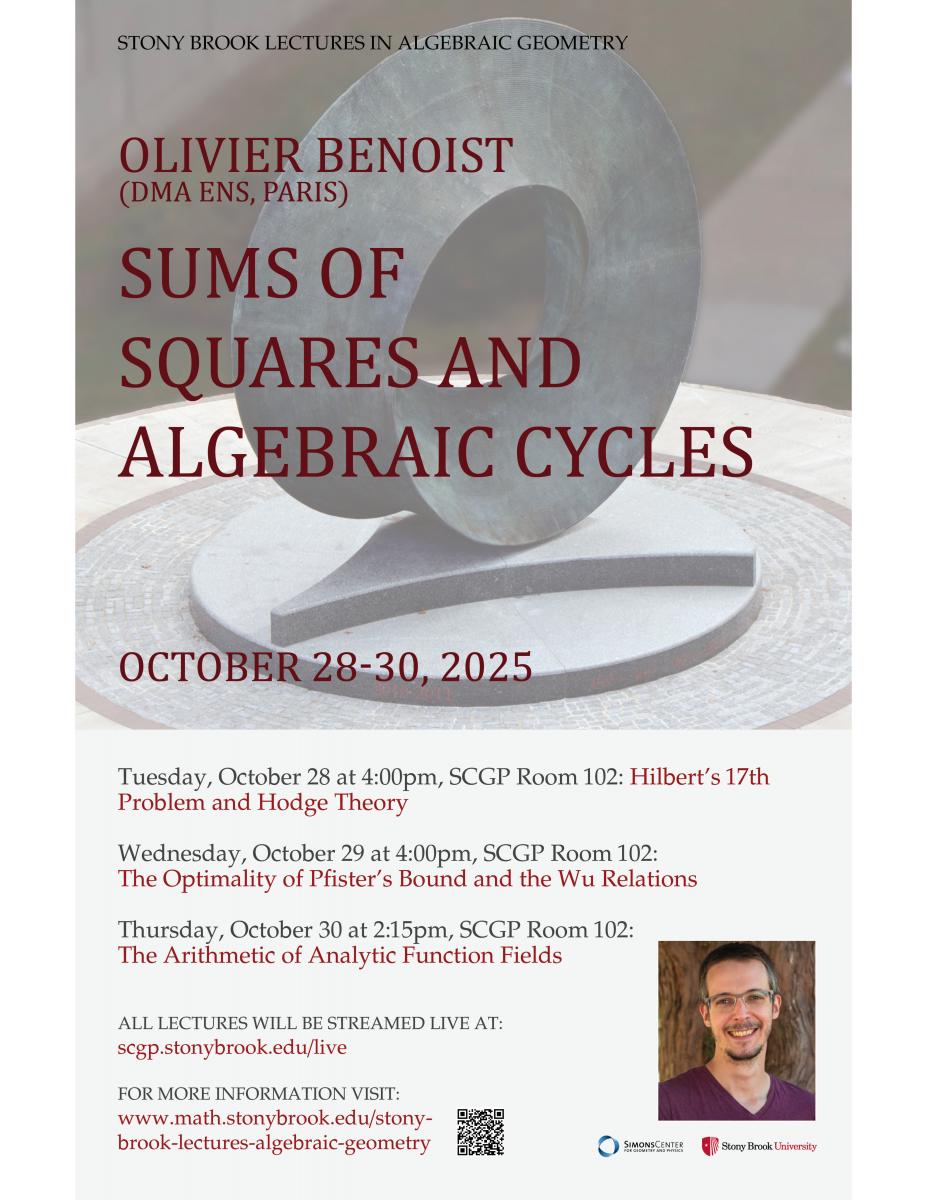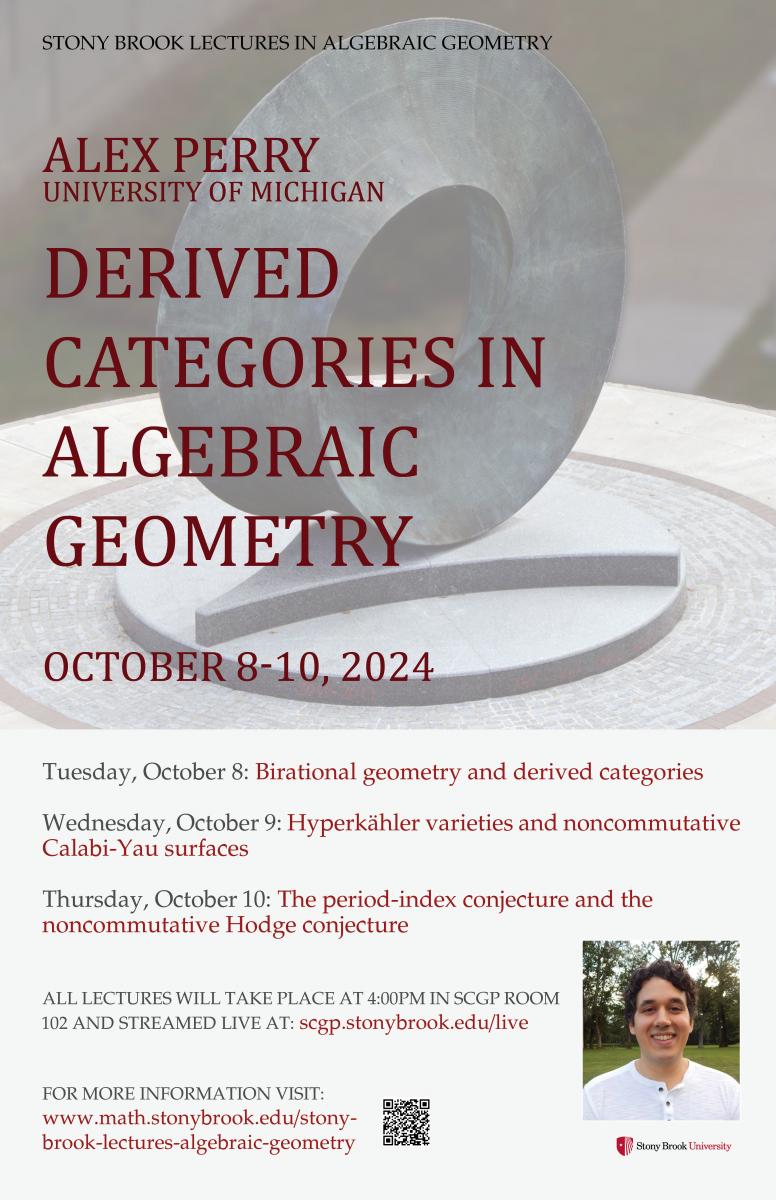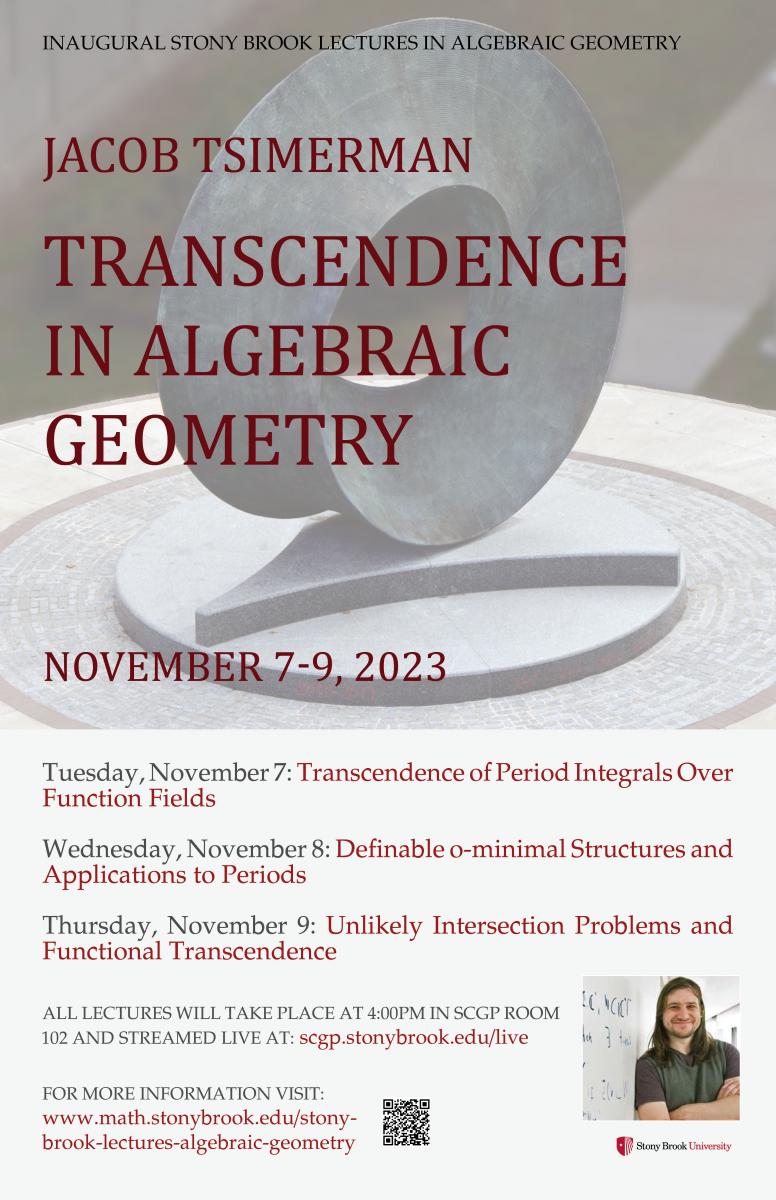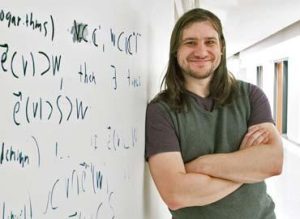
Lecture series title: Sums of squares and algebraic cycles
Lecture 1: Hilbert's 17th problem and Hodge theory.
Abstract 1: In the first lecture, after providing a general introduction to sums of squares problems, we will focus on polynomials in two variables. In this case, we will explain why sums of squares problems are entirely governed by Hodge theory (applied equivariantly with respect to the action of complex conjugation). We will give applications to the optimality of Pfister's bound in dimension 2 (the
Cassels-Ellison-Pfister theorem), and to a density theorem for sums of 3 squares.
Lecture 2: The optimality of Pfister's bound and the Wu relations.
Abstract 2: In the second lecture, we will explore the optimality of Pfister's bound in dimension 3 or more. In dimension 3, this problem is closely related to existence questions for algebraic cycles in the
spirit of the integral Hodge conjecture and of the Griffiths-Harris conjecture in complex geometry. Leveraging this cycle-theoretic point of view, and relying in addition on tools from algebraic topology, we will show that Pfister's bound can always be improved for low degree polynomials in any number of variables. (Based on joint work with Olivier Wittenberg.)
Lecture 3: The arithmetic of analytic function fields.
Abstract 3: Is any nonnegative real-analytic function on R^n a sum of squares of real-analytic meromorphic functions? This analytic analogue of Hilbert's 17th problem is still open today. The third lecture will be devoted to this question. We will explain counterparts of the theorems of Artin and Pfister in this context, under an additional compactness hypothesis (e.g. on compact real-analytic manifolds). The proof relies on a study of Stein spaces (complex-analytic analogues of affine algebraic varieties) from the point of view of algebraic geometry.

Lecture series title: Derived categories in algebraic geometry
1) Birational geometry and derived categories
The derived category of coherent sheaves was originally conceived as a technical tool for studying sheaf cohomology in algebraic geometry, but it has since emerged as a powerful invariant of algebraic varieties in its own right. I will survey some of the known and conjectural relations between the structure of this category and birational geometry, especially in the cases of Calabi-Yau and Fano varieties. This perspective naturally leads to a "noncommutative" enlargement of classical algebraic geometry, in which spaces are reimagined as categories (as opposed to sets) with extra structure. The talk is meant to be a general introduction to these ideas; no previous knowledge of derived categories or birational geometry will be assumed.
2) Hyperkähler varieties and noncommutative Calabi-Yau surfaces
Hyperkähler varieties form one of the three building blocks for projective varieties with trivial canonical bundle. Their classification is widely open, but there is growing evidence that the problem is closely related to the classification of noncommutative Calabi-Yau surfaces. In particular, given such a surface, one can hope to construct hyperkähler varieties as moduli spaces of Bridgeland stable objects. I will discuss this circle of ideas, including recent work with Arend Bayer, Laura Pertusi, and Xiaolei Zhao completing the story for hyperkähler varieties of Kummer type.
3) The period-index conjecture and the noncommutative Hodge conjecture
The Brauer group is a fundamental invariant classifying the central division algebras over a field, with numerous applications in geometry and arithmetic. In the case of the function field of a variety, the period-index conjecture proposes a precise bound on the most basic invariant of a division algebra, its dimension, in terms of its order in the Brauer group. I will explain recent progress on this conjecture, including a proof for unramified division algebras over the function field of an abelian threefold, based on joint work with James Hotchkiss. This depends on a reinterpretation of the conjecture in terms of a noncommutative version of the integral Hodge conjecture, which for noncommutative Calabi-Yau threefolds can be approached using enumerative geometry.
All lectures will take place from 4:00 – 5:00pm in SCGP room 102
Live streaming: scgp.stonybrook.edu/live
Inaugural Stony Brook Lectures in Algebraic Geometry
Speaker: Professor Jacob Tsimerman (University of Toronto)
“Transcendence in Algebraic Geometry”
Tuesday, November 7. Title: Transcendence of period integrals over function fields. ABSTRACT
Wednesday, November 8. Title: Definable o-minimal structures and applications to Periods. ABSTRACT
Thursday, November 9. Title: Unlikely Intersection problems and Functional Transcendence. ABSTRACT
All lectures will take place from 4:00 – 5:00pm in SCGP room 102
Live streaming: scgp.stonybrook.edu/live
Photo credit: Courtesy Centre de Recherche Mathématique
----------------------
The Stony Brook Lectures in Algebraic Geometry
We are delighted to announce the annual Stony Brook Lectures in Algebraic Geometry. These will bring an outstanding early-career mathematician to Stony Brook for a week in the fall to deliver a series of three lectures on a topic related to algebraic geometry or neighboring areas. The lectures are supported by an endowment generously created by Sorin Popescu, formerly a member of our department and now at Renaissance Technologies. A scientific committee will choose the speaker.
The inaugural lectures will be given by Professor Jacob Tsimerman of the University of Toronto. They will take place on Tuesday, Wednesday and Thursday, November 7, 8 and 9, 2023 from 4:00 – 5:00 pm.
Professor Tsimerman received his PhD from Princeton in 2011, under the direction of Peter Sarnak. After graduating he went to Harvard as a Junior Fellow. He joined the faculty at Toronto in 2014. Among other honors, he was awarded the SASTRA Ramanujan Prize in 2014, the Ribenboim Prize in 2916, and the New Horizons in Mathematics Prize in 2022.
The scientific committee for the inaugural lectures consisted of Radu Laza, Robert Lazarsfeld, Mircea Mustata, Burt Totaro and Claire Voisin.


